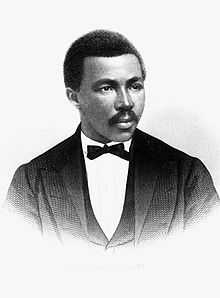Robert B. Elliott
| Robert Brown Elliott | |
|---|---|
 | |
| South Carolina Attorney General | |
| In office December 14, 1876 – May 1877 | |
| Governor | Contested |
| Speaker of the South Carolina House of Representatives | |
| In office 1874–1876 | |
| Member of the South Carolina House of Representatives | |
| In office 1874–1876 | |
| In office 1868–1869 | |
| Member of the U.S. House of Representatives from South Carolina's 3rd district | |
| In office March 4, 1871 - November 1, 1874 | |
| Preceded by | Solomon L. Hoge |
| Succeeded by | Lewis C. Carpenter |
| Personal details | |
| Born | August 11, 1842 Liverpool, England, United Kingdom (claimed) |
| Died | August 9, 1884 (aged 41) New Orleans, Louisiana |
| Resting place | St. Louis Cemetery No. 2 |
| Political party | Republican |
| Profession | lawyer, civil servant |
| Signature | |
| Military service | |
| Allegiance | |
| Service/branch | South Carolina National Guard |
| Years of service | 1869–1871 |
| Rank | Commanding General |
| Battles/wars | Reconstruction |
Robert Brown Elliott (1842–1884) was an African-American member of the United States House of Representatives from South Carolina, serving from 1871-1874.
Early life and education
Robert Brown Elliott's early life is a mystery.[citation needed] He claimed to have been born in Liverpool, England to West Indian immigrants. But, biographers have been unable to corroborate these facts.
Career
Elliott arrived in South Carolina in 1867 at the age of 25, where he established a law practice. Elliott helped organize the local Republican Party and served in the state constitutional convention.
In 1868 he was elected to the South Carolina House of Representatives. The next year he was appointed assistant adjutant-general; he was the first African-American commanding general of the South Carolina National Guard. As part of his job, he helped form a state militia to fight the Ku Klux Klan.
Elliott was elected as a Republican to the Forty-second and Forty-third United States Congress. He "delivered a celebrated speech" in favor of the Civil Rights Act of 1875.[1] He resigned on November 1, 1874, to fight political corruption in South Carolina. He served again in the South Carolina House of Representatives, where he was elected as Speaker of the House.
He ran successfully for South Carolina Attorney General in 1876. In the state elections that year, white Democrats regained dominance of the state legislature. The following year, 1877, when the last of the federal troops were withdrawn from South Carolina, he was forced out of office.[2]
References
- ↑ "Biographical Sidebar: Robert B. Elliott". America's Reconstruction - People and Politics After the Civil War. University of Houston. Retrieved 2009-08-27.
- ↑ http://baic.house.gov/member-profiles/profile.html?intID=4
Further reading
- "Robert Brown Elliott". Black Americans in Congress, 1870-2007. Prepared under the direction of the Committee on House Administration by the Office of History & Preservation, U. S. House of Representatives. Washington: Government Printing Office. 2008. ISBN 978-0-16-080194-5.
- Lamson, Peggy (1973). The Glorious Failure: Black Congressman Robert Brown Elliott and the Reconstruction in South Carolina. New York: W. W. Norton. ISBN 0-393-05451-9.
- Black Americans in Congress - Robert Brown Elliott: Representative, 1871–1874, Republican from South Carolina http://baic.house.gov/member-profiles/profile.html?intID=4
External links
- Robert B. Elliott at the Biographical Directory of the United States Congress
- African American Registry Board
| United States House of Representatives | ||
|---|---|---|
| Preceded by Solomon L. Hoge |
Member of the U.S. House of Representatives from South Carolina's 3rd congressional district 1871 – 1874 |
Succeeded by Lewis C. Carpenter |
|